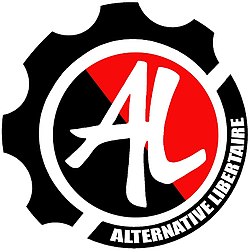This article has multiple issues. Please help improve it or discuss these issues on the talk page . (Learn how and when to remove these messages)
|
Alternative Libertaire | |
|---|---|
 | |
| Leader | Collective leadership |
| Founded | 1991 |
| Dissolved | 10 June 2019 |
| Preceded by | Union of Libertarian Communist Workers |
| Merged into | Libertarian Communist Union |
| Headquarters | Paris |
| Ideology | Anarcho-communism |
| Political position | Far-left |
| International affiliation | International Libertarian Solidarity |
| Colours | Red, Black |
| Party flag | |
 | |
| Website | |
| alternativelibertaire.org | |
Alternative libertaire (AL, "Libertarian Alternative") was a French anarchist organization formed in 1991 which publishes a monthly magazine, actively participates in a variety of social movements, and is a participant in the Anarkismo.net project. In 2019 the organization merged into the Union Communiste Libertaire (UCL, "Libertarian Communist Union")
Contents
Alternative Libertaire, now UCL, identifies with various tendencies within the libertarian socialist current of anarchism including anarcho-communism and anarcho-syndicalism. It was also a member of the International Libertarian Solidarity network.

